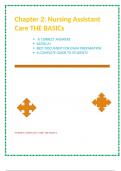Chapter 2: Nursing Assistant
Care THE BASICs
% CORRECT ANSWERS
RATED A+
BEST DOCUMENT FOR EXAM PREPARATION
A COMPLETE GUIDE TO STUDENTS
NURSING ASSISTANT CARE THE BASICS
,Nursing Assistant Care The Basics Examination
Communication - answer-Exchanging information with others
Alternative ways that people communicate - answer-Signs, signals, pictures,
drawings, and behavior
verbal communication - answer-spoken or written words (ex. Oral report)
nonverbal communication - answer-communication using body movements,
gestures, and facial expressions rather than speech (Body language i.e. Shrugging
shoulders)
What should an NA do if they can't understand a resident - answer-Get an
interpreter or someone who can understand them
NA should not speak a different ___________ when speaking with staff in front of
residents - answer-Language
Characteristics of NA's reports - answer-Brief, accurate oral and written reports to
residents and staff
What should an NA be report immediately - answer-Falls, chest pain, severe
headache, trouble breathing, abnormal pulse/respiration/BP, change in mental
status, sudden weakness/ loss of mobility, fever, loss of consciousness, ch age in
level of consciousness, bleeding, swelling of a body part, change in residents
condition, bruises/abrasions (or other signs of abuse)
Resident information should only be shared with who? - answer-Care team
what should the NA do when residents report symptoms, events, or feelings? -
answer-have the resident repeat what they have said, ask them more information,
ask open ended questions (more info than yes/no cause the resident is encourages
to give more facts/details)
when communicating with residents the NA should - answer-always greet them by
their preferred name, identify themself, focus on the topic to be discussed, face the
resident while speaking/avoid talking into space, talk with the resident while
giving care, listen/respond to the resident, praise the resident, smile often,
, encourage the resident to interact with them/others, be courteous, and tell the
resident when they are leaving the room
NA's should not refer to residents by their ________ name unless the resident has
asked them too - answer-first
can outside terms be used to address a resident like sweetie, honey, or dearie? -
answer-no
what are 2 kinds of information used in reporting - answer-objective and subjective
information
objective information (signs) - answer-what a person sees, hears, touches, or
smells. Its collected by using the senses.
subjective information (symptoms) - answer-something a person cannot or did not
observe, but is based on something the resident reported that may or may not be
true
are objective and subjective report valuable? - answer-yes
observations the NA should look for in residents - answer-sight, hearing, touch,
smell
sight - answer-look for changes in residents appearance (ex. rashes, paleness,
swelling, discharge, weakness, sunken eyes, posture/gait:walking changes)
hearing - answer-listen to what residents say about their condition, family, or
needs. Reflect on the residents words, tone, and breathing
touch - answer-observe the residents skin and pulse
smell - answer-observe the residents body or breath odor
what could odor suggest - answer-poor bathing, infections, or incontinence
what could breath odor suggest - answer-alcohol, tobacco, indigestion, or poor
mouth care
what should the NA do for oral reports? - answer-write notes




